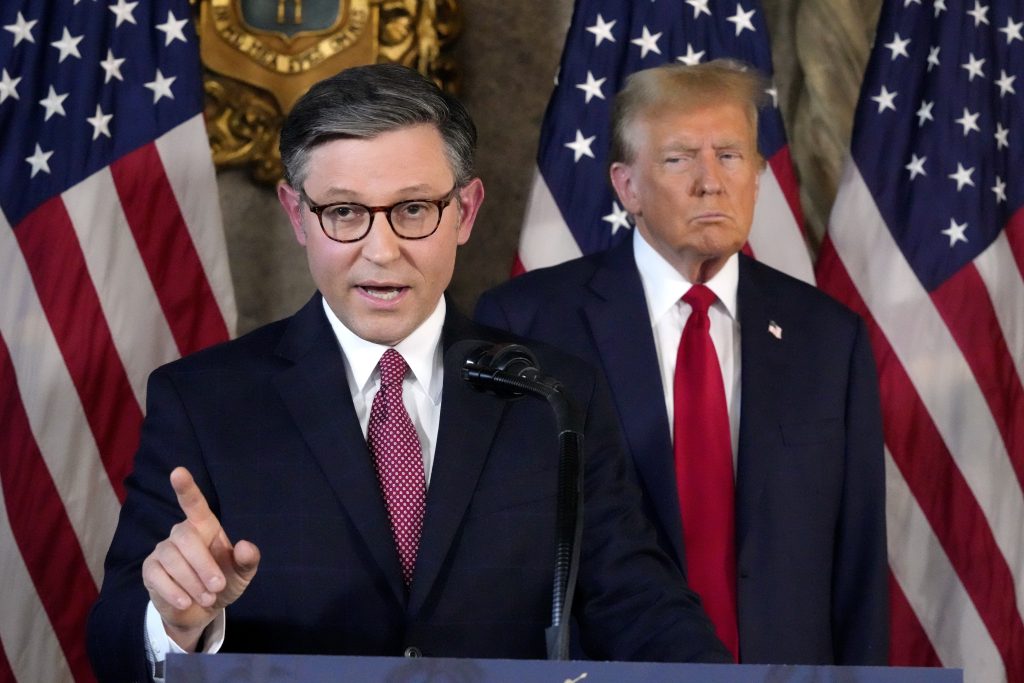Donald Trump makes his first visit to Capitol Hill since leaving the presidency Thursday morning, meeting with Republican lawmakers in what is being billed as a resolutely forward-looking session focused on a potential 2025 legislative agenda.
In fact, Trump has bigger, more immediate legislative priorities.
He has been obsessed in recent weeks with harnessing the powers of Congress to fight on his own behalf and go to war against the Democrats he accuses of “weaponizing” the justice system against him.
It’s a campaign he orchestrated in the days after his May 31 conviction on 34 felony counts in New York, starting with a phone call to the man he wanted to lead it: Speaker Mike Johnson.
Trump was still angry when he made the call, according to those who have heard accounts of it from Johnson, dropping frequent F-bombs as he spoke with the soft-spoken and pious GOP leader.
“We have to overturn this,” Trump insisted.
Johnson sympathized with Trump’s frustration. He’d been among the first batch of Republican lawmakers to appear alongside Trump at the Manhattan trial. He’d been harping on Manhattan District Attorney Alvin Bragg’s case and the alleged broader abuse of the justice system since before he took the gavel.
The speaker didn’t really need to be convinced, one person familiar with the conversation said: Johnson, a former attorney himself, already believed the House had a role to play in addressing Trump’s predicament. The two have since spoken on the subject multiple times.
But sympathy can only go so far. With a slim majority and skittish swing-district members, Johnson is already finding it difficult to deliver for Trump.
Republicans have all but abandoned their effort to impeach President Joe Biden, as Trump wants. Wednesday’s contempt vote against Attorney General Merrick Garland squeaked by only after an intense whipping effort. And now a series of proposals targeting what Republicans call “rogue prosecutors” (i.e., those investigating Trump) appear to have a wobbly future.
House GOP leaders, for instance, spent yesterday afternoon whipping a bill written by Rep. Russell Fry (R-S.C.) that would allow presidents charged at the state level to move those cases to federal court — effectively nullifying the power of officials like Bragg and Fani Willis, Trump’s prosecutor in Fulton County, Georgia. The bill was filed in April 2023 and reported by the Judiciary Committee in last September; only now is it being readied for possible floor action.
Johnson has also been in talks with Judiciary Committee chair and Trump ally Jim Jordan (R-Ohio) about using the appropriations process to target special counsel Jack Smith’s probe. It’s an apparent softening of his position: He said in a POLITICO interview last month that he found a similar idea by Rep. Marjorie Taylor Greene (R-Ga.) unworkable; now, he’s actually looking into it.
“That country certainly sees what’s going on, and they don’t want Fani Willis and Alvin Bragg and these kinds of folks to be able to continue to use grant dollars for targeting people in a political lawfare type of way,” Jordan told us.
The problem, of course, is that these proposals don’t yet have the votes to pass. One senior appropriator, Rep. Mike Simpson (R-Idaho), said the idea of defunding Smith was “stupid.”
“I don’t think it’s a good idea unless you can show that [the prosecutors] acted in bad faith or fraud or something like that,” he said. “They’re just doing their job — even though I disagree with what they did.”
“We accuse Democrats of weaponizing the Justice system,” said another skeptical senior Republican who was granted anonymity to speak with fear of MAGA blowback. “That’s exactly what we’d be doing.”
Johnson’s leadership team isn’t giving up just yet. Off the House floor yesterday, Fry — who said he’s not spoken to Trump about his proposal — said there’s an education effort underway inside the House GOP.
His argument: Federal lawmakers, executive officials and judges currently have the ability to try to move their local cases to federal court. Why shouldn’t the leader of the free world? (One difference, of course, is that unlike those federal officials, Trump isn’t currently in office.)
“In my experience so far, the more [House members] have heard about it, the more comfortable they are with it,” he said. “It’s not a unique concept.”
What to expect Thursday
The plan for Trump’s meetings — 9:30 a.m. meeting with House Republicans at the Capitol Hill Club and a 12:30 p.m. lunch with GOP senators at NRSC headquarters — doesn’t explicitly include discussions of Trump’s legal matters and how they might be addressed. (That, of course, is no guarantee that Trump won’t bring them up.)
Instead, the visit is being cast as a chance for Hill Republicans to unite behind their party leader heading into a contentious election season and to also talk about what comes next should Republicans manage to win a governing trifecta in November.
A person close with Trump said the former president will: (1) express his desire to “protect seniors” by not allowing cuts to Social Security or Medicare; (2) reiterate his intention to crack down on the border; (3) lay out a broad vision for economic policy, including cutting taxes and bringing down prices, and (4) preview a U-turn on Biden’s foreign policy priorities.
Like this content? Sign up for POLITICO’s Playbook newsletter.







